In this article:
Hair growth is a gradual process involving multiple stages. Nutrition, genetics, hormone levels, and stress levels all play major roles in regulating hair growth.
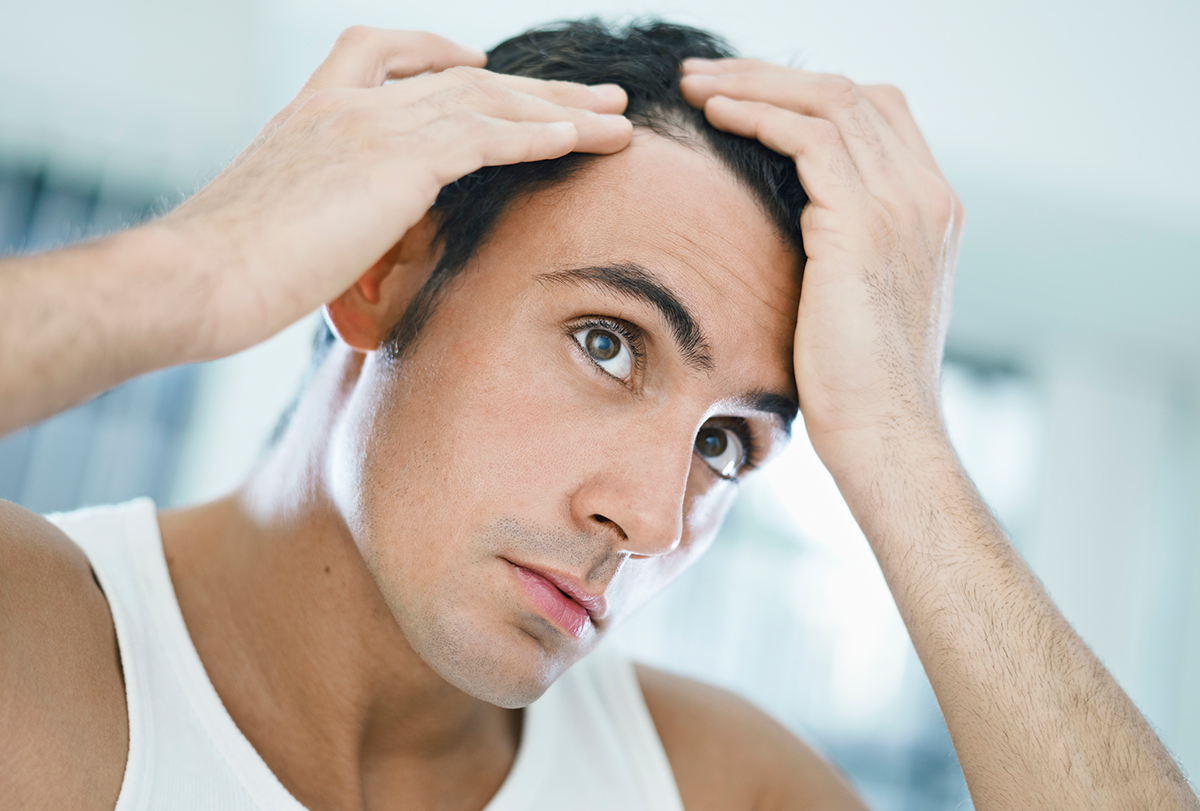
Any changes or deficiencies in these factors can cause hair loss or balding. Thus, there is no “one size fits all” when it comes to hair loss treatment. (1)
Male-pattern baldness, or androgenic alopecia, is a very common phenomenon that affects nearly a third of all men in the United States. There is significant research currently underway to find a cure for alopecia, and some of it has been fruitful. Currently, there are a number of effective medical treatments for patients suffering from alopecia. (2)
Different Approaches to Grow Hair Faster in Men
If you or anyone you know is suffering from male-pattern baldness or hair loss in general, don’t panic. Here are some useful ways to stimulate hair growth:
1. Dietary recommendations

Hair requires nutrients to grow. Consuming a diet rich in these vital nutrients can rejuvenate the hair follicles and stimulate hair growth.
a. Vitamin B7 (biotin)
Vitamin B7, or biotin, is a B complex vitamin that is essential for hair growth and strength. In fact, biotin deficiency is a cause of hair loss in some cases. (3)
Consuming biotin as a supplement as well as via your food is a great way to boost hair growth.
Side effects: Make sure to consult a doctor and run necessary tests before taking oral biotin supplements. Biotin supplementation is usually only recommended when you are not getting enough of it from your diet or you have a deficiency of the vitamin. Excess levels of biotin can interfere with thyroid hormone levels. (4)
b. Vitamin D
Vitamin D is another vitamin that plays a major role in hair synthesis. A study conducted on patients with alopecia demonstrated that nearly 40% of them were deficient in vitamin D. (5)(6)(7)
c. Vitamin E derivatives (tocotrienols)
Vitamin E contains potent antioxidant compounds – tocopherols and tocotrienols. Antioxidants help reduce oxidative damage to the hair and skin cells and prevent hair loss.
A study conducted over 8 months revealed that oral supplementation of tocopherols and tocotrienols improved hair growth significantly in patients with alopecia. (1)(8)
d. Zinc
Zinc is an important nutrient required for a number of body functions. It plays an important role in enzyme catalysis, nail and hair growth, and protein synthesis.
Taking oral zinc supplements or using topical zinc formulations can help make your hair thicker and stronger. (9)
e. Fatty acids
Fish supplementation is a relatively new but effective concept for hair growth. Oral supplements containing protein complexes and essential fatty acids extracted from fish help increase hair growth and strength. (10)(11)
2. Medication
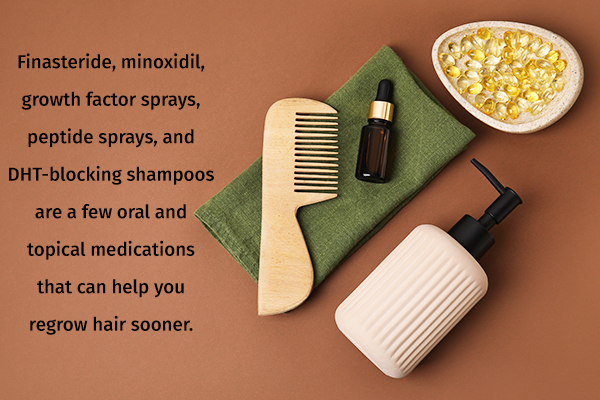
There are a few oral and topical medications that can help you regrow hair sooner, such as the following:
a. Finasteride
Finasteride is an oral medication that helps improve hair growth and decrease hair loss. It is specifically used to treat male-pattern baldness and is not recommended for women and children. It works by blocking DHT. (12)
Side effect: Finasteride may cause mental health issues such as depression and psychosis. It may also cause erectile dysfunction and decreased libido. (13)
b. Minoxidil (MXD)
Minoxidil is the first-line drug used to treat hair loss and alopecia. It helps stimulate hair growth in the hair follicles and significantly improves hair strength and thickness in most cases. (14)(9)
c. Growth factor sprays
Growth factor concentrate (GFC) sprays can help reduce male-pattern balding but in early stages as adjunctive treatment to PRP, minoxidil, etc. Several studies have shown their effectiveness in curing androgenic alopecia. (15)
d. Peptide sprays
Peptide sprays such as 5-ALA and GHK peptide sprays can help increase hair growth and strength by nourishing the hair follicles. (16)
e. DHT-blocking shampoo
Male-pattern baldness is caused by DHT, an androgen hormone.
Nowadays, there are certain shampoos that contain DHT-blocking agents to help reduce the effects of DHT on the hair follicles. Most DHT-blocking shampoos are medicated and should not be used without a doctor’s advice.
3. Clinical treatments
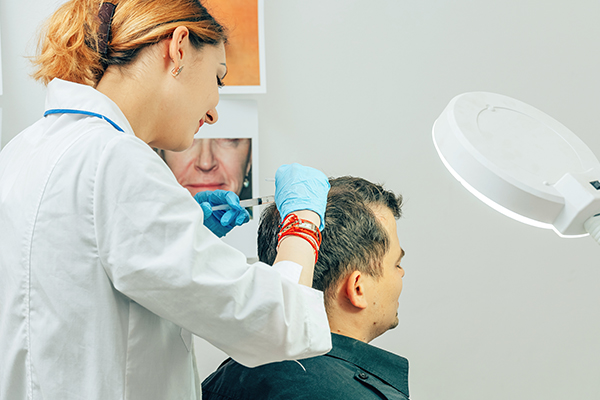
You can also seek the following clinical procedures to promote hair growth:
- Mesotherapy: Mesotherapy is a process in which certain drugs and nutrients such as vitamins are injected into the scalp in very small doses. It can help regrow hair in people suffering from androgenic alopecia and telogen effluvium. (17)
- Hair transplant: Hair transplantation is a procedure in which hair from the back of the head is grafted onto the balding areas of the scalp. It is a permanent solution for androgenetic alopecia.
- Low-level laser therapy (LLLT): Laser therapy is another nonsurgical procedure to regrow hair. Light beams are directed towards the hair follicles and stimulate hair growth. LLLT can be beneficial for people suffering from androgenic alopecia, alopecia areata, and hereditary hair loss.
- Platelet-rich plasma (PRP): PRP therapy involves isolation of plasma from your blood and then injecting this blood into an area of the scalp. (18) This process is repeated every 6 months to reduce hair loss and grow new hair.
4. Treatment of the underlying disorder
Certain metabolic conditions, skin diseases, and hormonal disorders may affect hair growth and lead to hair loss. Some of these include dermatitis, eczema, and thyroid disorders.
It is important to inform your doctor about all your symptoms and medical history. Treating the underlying cause of your hair loss usually treats the issue.
Biology of Hair Growth
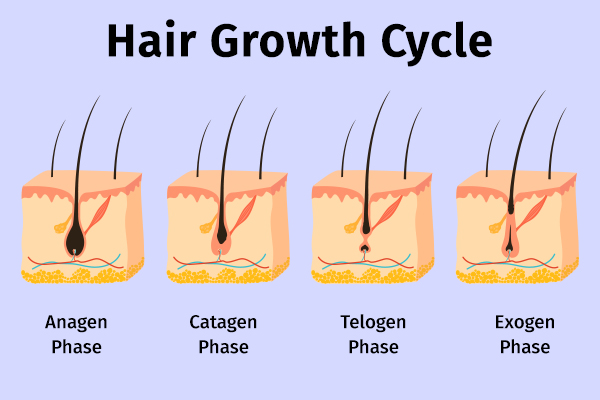
Hair growth is a cyclic process that involves four phases: the anagen phase, catagen phase, telogen phase, and exogen phase.
- Anagen phase (growth phase): The anagen phase is the first stage of hair growth where a new hair strand starts developing and growing from the hair follicle. Most of the hair on your head is in this phase.
- Catagen phase: The catagen phase is the middle stage of hair growth. In this phase, the hair stops growing and forms a separation from the hair root.
- Telogen phase (resting phase): The telogen phase, also known as the resting phase, is the stage where the hair stops growing and stays dormant before being shed.
- Exogen phase (shedding phase): This is the final phase of hair growth in which the hair strand falls out to make way for new hair to grow in its place.
Every single hair strand on your head is in a different phase of this cycle. Thus, some hair strands are shed every day, while other hair strands keep growing. It is completely normal to lose up to 100 hair strands in a day. However, losing more hair than that or failing to grow new hair in their place is indicative of hair loss.
Androgenic alopecia is a type of hair loss that can occur in both men and women. It occurs due to high levels of dihydrotestosterone (DHT) levels in the body.
Testosterone is known to stimulate hair growth on the face and body. However, excessive production of this hormone can actually cause shrinking of the hair follicles on your scalp, curbing hair growth. (19) In men, it can lead to male-pattern baldness.
How Do Dermatologists Find Out What’s Causing Hair Loss?
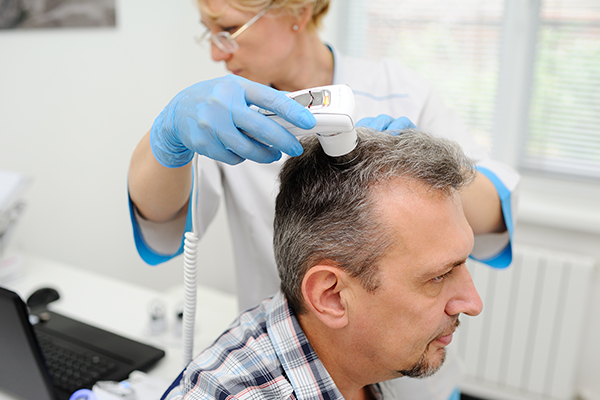
Dermatologists usually diagnose the root cause of your hair loss by:
- Observing your scalp and hair closely to check their condition.
- Asking you to undergo certain blood tests, scalp biopsy, or other diagnostic procedures.
- Inquiring about your family history and medical history.
Final Word
Male-pattern baldness is a common disorder that affects millions of men around the world. Fortunately, recent advancements in medicine have made it possible to reverse androgenic alopecia in many cases.
If you are suffering from hair loss and thinning, make an appointment with your dermatologist and follow the treatment as prescribed. Apart from that, there are certain home remedies you can try to increase hair growth naturally.

- Was this article helpful?
- YES, THANKS!NOT REALLY


